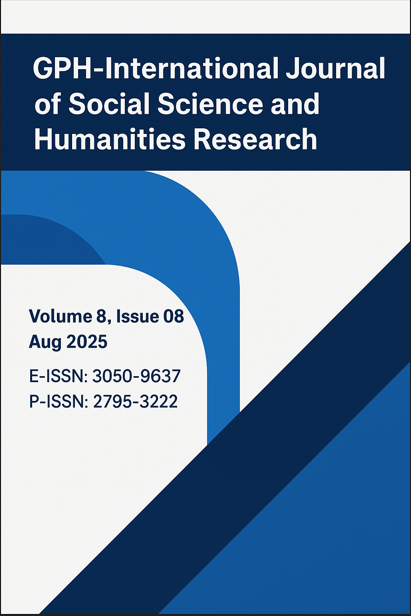DIGITAL TRANSFORMATION IN ZIMBABWE’S PUBLIC ADMINISTRATION: OPPORTUNITIES, CHALLENGES, AND ETHICAL IMPLICATIONS OF E-GOVERNANCE
Abstract
Zimbabwe's bold commitment to digital evolution in public administration marks a game-changing moment for e-governance, despite operating in a resource-poor context. This is a mixed methods study of the opportunities, challenges and ethical implications of Zimbabwe's initiatives (e.g. ZimConnect) combining quantitative data about governance and access to digital technologies with qualitative, interviews and document analysis of both government reports and media. The findings highlight demonstrable improvements in service delivery in public administration, but these are restrained by long-standing urban-rural digital divides and infrastructure issues. The ethical ramifications of data use and potential misuse, especially in a politically sensitive context, raise questions about protocols and frameworks. The innovative recommendations (e.g. solar-powered digital hubs, oversight through blockchain and a lab for digital model that is culturally reflexive) suggest a viable and equitable way of delivering governance. Will Zimbabwe be able to mobilize the initiative to leverage its mobile-led characteristics to rethink the public administration? This study calls for scholars and practitioners to think critically and creatively about possible avenues in building a new kind of ethical e-governance to support public administration, establishing Zimbabwe as a lighthouse for future transformed digital development in the Global South.
Downloads
References
African e-Governance Hub. (2023). African countries e-gov challenges & solutions. https://e-governancehub.ru/african-countries-e-gov-challenges/
Amnesty International. (2023). Chilling effects of surveillance and human rights. Oxford Academic.
Braun, V., & Clarke, V. (2006). Using thematic analysis in psychology. Qualitative Research in Psychology, 3(2), 77–101. https://doi.org/10.1191/1478088706qp063oa
BTI. (2024). Zimbabwe country report 2024. Bertelsmann Transformation Index. https://bti-project.org/en/reports/country-report/ZWE
Bwalya, K. J., & Mutula, S. M. (2014). E-government: Implementation, adoption and synthesis in developing countries. De Gruyter.
Chigudu, D. (2020). Public sector reform and the challenges of e-governance in Zimbabwe. African Journal of Public Administration and Management, 27(1), 45–60.
Chikukwa, T., & Mupindu, M. (2024). Digitalization of the administrative function in Zimbabwe’s public sector. Kennesaw State University.
Chikukwa, T., & Mupindu, M. (2024). Digitalization of the administrative function in Zimbabwe’s public sector. African Conference on Information Systems and Technology. https://digitalcommons.kennesaw.edu/cgi/viewcontent.cgi?article=1202&context=acist
CIPESA. (2018). Privacy and personal data protection in Zimbabwe. https://cipesa.org/wp-content/files/State-of-Internet-Freedom-in-Zimbabwe-2018.pdf
CIPESA. (2024). Privacy at risk: Challenges to data and online security. https://africaninternetrights.org/sites/default/files/Digital%2520Rights%2520Southern%2520Africa_ED2.pdf
Creswell, J. W., & Plano Clark, V. L. (2018). Designing and conducting mixed methods research (3rd ed.). Sage.
Davis, F. D. (1989). Perceived usefulness, perceived ease of use, and user acceptance of information technology. MIS Quarterly, 13(3), 319–340.
Government of Zimbabwe. (2019). National ICT Policy Framework. Ministry of Information and Communication Technology.
Heeks, R. (2006). Implementing and managing e-government: An international text. Sage.
ITU. (2023). Global connectivity report 2023. International Telecommunication Union.
Margetts, H., & Dunleavy, P. (2013). The second wave of digital-era governance. Public Administration Review, 73(2), 139–150.
Media Institute of Southern Africa. (2025). Safeguarder or silencer? Zimbabwe's data law on trial. https://ngoafricawatch.net/2025/04/21/safeguarder-or-silencer-zimbabwes-data-law-on-trial/
Mo Ibrahim Foundation. (2024). Ibrahim Index of African Governance 2024. https://iiag.online/
Munyoro, G., & Muposhi, A. (2019). Mobile technology and financial inclusion in Zimbabwe. Journal of African Business, 20(4), 483–499.
Munyoro, G., et al. (2024). Barriers to digital transformation in Zimbabwean local governments. Journal of Economics and Sustainable Development. https://www.jesd-online.com/articles/barriers-to-digital-transformation-in-zimbabwean-local-governments.pdf
Mutuku, L., & Mahihu, C. (2020). Rwanda’s Irembo platform: A case study in e-governance. African Journal of ICT, 12(2), 22–35.
Mutungwe, E., & Gumbo, T. (2021). E-governance in Zimbabwe: Opportunities and challenges. Zimbabwe Journal of Public Policy, 5(1), 88–102.
Ndemo, B. (2015). The Huduma Centre model in Kenya. Government Information Quarterly, 32(4), 409–417.
Ndlovu, S. (2024). Data protection in Zimbabwe with reference to the Covid-19 pandemic. Potchefstroom Electronic Law Journal. https://www.saflii.org/za/journals/PER/2024/72.pdf
O’Neil, C. (2016). Weapons of math destruction: How big data increases inequality. Crown.
Patton, M. Q. (2015). Qualitative research & evaluation methods (4th ed.). Sage.
Research ICT Africa. (2023). Data governance in Zimbabwe: Opportunities and challenges. https://researchictafrica.net/research/data-governance-in-zimbabwe-opportunities-and-challenges/
Twinomurinzi, H., et al. (2017). Ethical e-governance in South Africa. South African Journal of Information Management, 19(1), 1–10.
U.S. Embassy in Zimbabwe. (2025). Innovation meets opportunity: A milestone in Zimbabwe's digital future. https://zw.usembassy.gov/innovation-meets-opportunity-a-milestone-in-zimbabwes-digital-future/
UNCTAD. (2025). Zimbabwe: eTrade Readiness Assessment. https://unctad.org/publication/zimbabwe-etrade-readiness-assessment
United Nations. (2020). E-government survey 2020: Digital government in the decade of action. United Nations.
World Bank. (2023). CPIA quality of public administration rating: Zimbabwe. https://www.worldbank.org/en/data/datatopics/cpia/country/zimbabwe
World Bank. (2023). Digital development indicators: Zimbabwe. World Bank Group.
Yin, R. K. (2014). Case study research: Design and methods (5th ed.). Sage.
ZimStat. (2023). Zimbabwe ICT access and usage report. Zimbabwe National Statistics Agency.
Zinyama, T., & Nhema, A. (2024). E-government and development in Zimbabwe: An appraisal. International Journal of Frontiers in Multidisciplinary Research. https://www.ijfmr.com/papers/2024/6/28886.pdf
Zuboff, S. (2019). The age of surveillance capitalism. PublicAffairs.
The authors and co-authors warrant that the article is their original work, does not infringe any copyright, and has not been published elsewhere. By submitting the article to GPH-International Journal of Social Science and Humanities Research, the authors agree that the journal has the right to retract or remove the article in case of proven ethical misconduct.














 Firozpur Jhirka, Haryana, India
Firozpur Jhirka, Haryana, India

